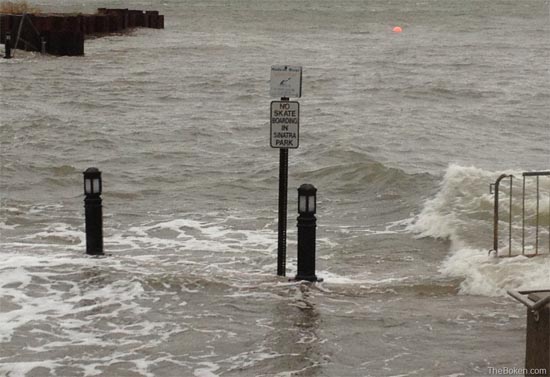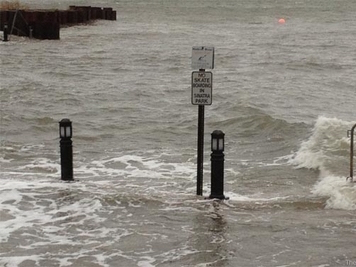UPDATE: On February 10, 2015, United States Magistrate Judge Mark Falk issued an order allowing the Hudson Tea Buildings Condominium Association to intervene in Shipyard Assocs. v. City of Hoboken. The parties to this case are currently conducting discovery. The developers of the Monarch towers project, proposed over a pier in the Hudson River, have challenged Hoboken’s amended flood ordinance that prohibits building on piers.
FBW | November 26, 2014
Today, United States Magistrate Judge Mark Falk granted the Fund for a Better Waterfront’s (FBW) motion to intervene in Shipyard Associates v. City of Hoboken. Last December, following Superstorm Sandy, the City of Hoboken enacted an amended flood ordinance and corresponding zoning that prohibits building residential projects on piers and platforms over the Hudson River.
The purpose of these ordinances is to keep people out of harm’s way in the Federal Emergency Management Agency’s (FEMA) designated Coastal High Hazard Zone. In effect, they would prohibit the construction of the Monarch towers, two ten-story residential towers, the Shipyard Associates has proposed to build on a pier. This pier is located at the north end of their 1160-unit project on Hoboken’s northeast waterfront.
In his opinion, Judge Falk wrote: “FBW’s core principles; its membership comprised largely of Hoboken residents; its advocacy efforts focused on open space and flood related issues in Hoboken; and its public support of the Ordinances amount to a sufficient legally protectable interest to support intervention.” The Judge also concluded that FBW’s interest in this case could diverge from those of the City of Hoboken, thus satisfying another right to intervene in this litigation based on the Federal Rule of Civil Procedure.
Attorneys Aaron Kleinbaum of the Eastern Environmental Law Center and Renee Steinhagen of New Jersey Appleseed Public Interest Law Center have represented FBW in this matter. On February 26, 2014, Shipyard Associates, represented by the law firm Connell Foley, filed a summons and complaint with the United States District Court in Newark, New Jersey challenging the amended Hoboken ordinances.
Hoboken was especially hard-hit during Superstorm Sandy. The surge of the storm was especially devastating to the New Jersey shoreline, including the Hudson River. The City of Hoboken has taken a series of measures to protect its residents and businesses from future storms. The challenged ordinances were based on models promulgated by the New Jersey Department of Environmental Protection (NJDEP) and the latest studies issued by the FEMA. All piers on New Jersey’s Hudson River waterfront, including the pier for the proposed Monarch towers, are situated in FEMA’s highest flood-risk area designated as the “Coastal High Hazard Zone.”
Based on new FEMA standards, any new construction in the Coastal High Hazard Zone would need to be elevated two feet above the base flood elevation for a 100-year flood and allow flood waters and waves to flow freely underneath the building. Shipyard Associates current application for building the Monarch Towers does not comply with these new standards.
In 2011, the Shipyard developers completed the final units of an 1160-unit residential project that the Hoboken Planning Board approved in 1997. The Planning Board’s 1997 site plan approval required the Shipyard Associates to build open space, including tennis courts, a tennis pavilion and a portion of the Hudson River Waterfront Walkway on the final parcel, Development Block G, once the final units were completed. The developers also signed an agreement with the City of Hoboken that included this commitment to build the open space.

The Hoboken shoreline with a submerged portion of Sinatra Park during Superstorm Sandy.
Photo Credit: TheBoken.com.
Brothers David and Michael Barry, the principals of Shipyard Associates, reneged on this commitment to build the open space and in May of 2011 proposed to build two 11-story towers, a total of 78 units on Development Block G. About two-thirds of this final parcel is a pier that sits over the Hudson River at the Weehawken Cove.
The City of Hoboken, the Hudson Tea Building Condo Association and FBW have all challenged this development project. The various court actions have included denials by the Hoboken Planning Board and Hudson County Planning Board which Shipyard Associates has sought to reverse and a NJDEP waterfront permit granted for the project that the objectors are seeking to overturn. All of these cases are at various stages of appeal at considerable cost to the taxpayers of Hoboken.
But this federal case could be central to the final disposition of this case. If this court upholds the Hoboken ordinances, the Monarch Project will be confronted with a nearly impassable roadblock. Ordinances that protect the health and safety of its citizenry offer a solid legal basis for denying such a proposal.
Related links
Court opinion granting FBW intervenor status
FBW Brief (filed 06-13-2014)
Final legal dispute over Monarch Towers reaches NJ Supreme Court
NJ Supreme Court will rule on Monarch Towers dispute
Appellate Court ruling disregards well-established New Jersey land use case law
Monarch Towers sparks legal arguments over automatic approvals, changed circumstances, etc.
Appellate Court will hear appeal of 3 Monarch Towers cases
City settlement would shower tens of millions in benefits on Shipyard developers
Settlement proposed to end 5 year legal battle over Monarch Towers
Did NJDEP ignore its own coastal zone regs in granting permit? Appellate Court to decide
‘Rapacious’ developer must defend broken agreement in Appellate Court
Monarch towers case goes to Appellate Court
Monarch Towers litigation grinds on as public opposition persists
Federal judge grants FBW opportunity to help defend Hoboken’s flood ordinances
Developers challenge Hoboken flood ordinance in federal court
Judge grants automatic approval for controversial Monarch Towers
Monarch Towers described as classic case of bait and switch
Shipyard’s plan to privatize pier


